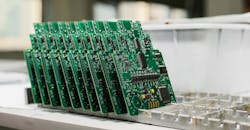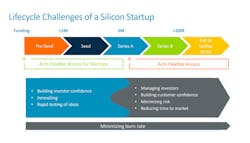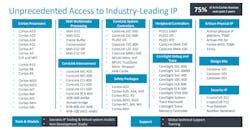Arm, which sells the blueprints to chips used in nearly every smartphone in the world including Apple's iPhone and Google's Pixel, said that it would grant access to its most popular designs, tools, and other services to emerging startups without paying upfront fees, a move the technology firm hopes will lure out the industry's future powerhouses.
Arm, with its global headquarters in Cambridge, England, and U.S. headquarters in Silicon Valley, is trying to ease challenges for startups in the semiconductor space. The startups are struggling to hold out against the escalating cost of building system-on-chips (SoCs), which have become increasingly intricate in recent years. These firms are fighting against the stigmas around startups in the global chip business, which has high barriers to entry.
Arm is one of the major players behind the scenes of the global chip business. The firm sells designs that more than 500 customers globally add as smaller components of chips. Qualcomm—the world's largest vendor of chips used in smartphones—and Apple—which builds the custom chips in its iPhones, AirPods and other consumer electronics—are major customers. It sells to Renesas, Broadcom, Texas Instruments, NXP and others.
The firm charges fees to license its intellectual property, tools, and services to other chip vendors, which have shipped out more than 150 billion chips based on its chip blueprints. These are separate from the royalty fees based on a percentage of the final selling price it charges for every processor sold. The company hopes to be implanted in about 1 trillion devices—including data centers, cars and Internet of Things devices—by 2035.
Arm's customers tend to shell out separate licensing fees before being granted access to each CPU, GPU or other SoC component they want to use. They are required to pay many of these fees throughout the development process, which can last half a decade or longer, before they are ready to send out the chip to production. Customers are charged for each design used in development of the chip, regardless of whether it is used in the final draft.
They could be charged millions of dollars, depending on the designs used, before the chip is manufactured. The fees are more than many startups in the semiconductor industry can afford. Patrick Moorhead, president of market researcher Moor Insights and Strategy, said that these startups are under pressure to roll out chips as fast as possible—or miss a market window. He added: "It's a risky business, and the potential for failure is huge."
The company rolled out its Flexible Access program last year, targeting startups and other smaller vendors that are struggling to afford its standard license fees. The program grants customers access to a package of intellectual property, global support, services and tools, for a smaller annual fee, deferring many of the other fees. The final cost is only calculated after the company evaluates the cores it needs and sends the chip design to the fab.
Arm said last month that it is expanding the program by erasing the annual access fee for startups early in development. The company said that it is wiping out all fees to access its intellectual property, tools, support and other services for startups with up to $5 million in funding. They are allowed to test out cores to determine the best fit before building the chip. Arm said it would not charge fees before prototypes start rolling out of the factory.
Phil Burr, who leads product management for Arm's Flexible Access program, said that the "startups need as much choice and flexibility as possible to allow them to experiment with solutions, and even pivot to different ones, as their understanding of customer needs and competition evolves.” He said the program not only grants access to global support, tools and other services but also training that can be used to upskill small engineering teams.
Dipti Vachani, senior vice president of the Internet of Things business at Arm, said erasing upfront payments for its intellectual property, tools, and services would give startups "the best opportunity to attract investment and scale." She said that it also would improve the survival rate of chip startups. She added the program offers a faster, cheaper path to "working prototypes, resulting in strengthened investor confidence for future funding.”
The Flexible Access program grants access to over 75% of its product portfolio, including processors in its Cortex-A, Cortex-R and Cortex-M lines, Mali GPUs, ISPs, interconnects, and other building blocks of chips today. Arm said it is currently offering the package to more than 40 customers, who are only charged for the designs used in the floor plan of the processor. Customers can access any of the blueprints in the package at any time.
Arm said it has also partnered with Silicon Catalyst, a Santa Clara, California-based firm that lends support to startups in the semiconductor space by rolling out to tools and other services at severe discounts. Arm said that as part of the agreement it would donate its most popular intellectual property the to the incubator's portfolio companies. Arm said that the program could reduce the time-to-market for chip startups by up to 12 months.
Silicon Catalyst has partnered with many of the largest players in the chip business to roll out expensive tools and services to startups at significant discounts or no cost at all. That includes chip design tools from Synopsys, test and measurement services from Keysight Technology, and contract manufacturing from TSMC, the world’s largest made-to-order chip maker. That helps curb millions of dollars in development costs faced by startups.
Arm hopes that the startups taking advantage of the program can survive long enough to start selling chips, paying royalty rates, and upgrading to more advanced chip designs.
About the Author
James Morra
Senior Editor
James Morra is the senior editor for Electronic Design, covering the semiconductor industry and new technology trends, with a focus on power electronics and power management. He also reports on the business behind electrical engineering, including the electronics supply chain. He joined Electronic Design in 2015 and is based in Chicago, Illinois.



